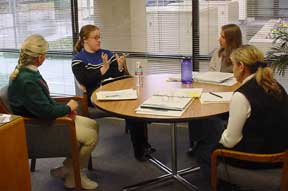Powers That Be
Civil Mediation In Washington County
by Bruce Bartlett
 Mediation programs are available free to every resident of Washington County through programs run by the cities of Hillsboro and Beaverton. Those who live west of 185th can use Hillsboro’s program, and those who live east of 185th can use the Beaverton service. Mediation programs are available free to every resident of Washington County through programs run by the cities of Hillsboro and Beaverton. Those who live west of 185th can use Hillsboro’s program, and those who live east of 185th can use the Beaverton service.
Conflicts between neighbors: loud music, noise, garbage dumping, dogs barking, children running around, blocked driveways, neglected property, harassment, false rumors. As urban population densities increase, the interactions between neighbors increase, and so does the likelihood for conflicts.
While our population is increasing, ironically, we generally know fewer and fewer of our neighbors. People move in and out frequently. Our busy lifestyles consume our time. We have few convenient opportunities to get to really know our neighbors.
Not only do we usually have few individual relationships that can provide a way to resolve the conflict, we almost never have an extended network of wise elders who can help us reach mutually satisfying resolutions. Some cultures regarded the mediator as a sacred figure, worthy of particular respect; and the role partly overlapped with that of traditional healer or tribal chief.
So what are our options? Mediation is a key to successful, non-judicial conflict resolution when no clear crime has been committed or no party is demanding that charges be pressed.. Mediation is a fast, fair, and cost-effective way to settle disputes that might otherwise end up in court. It is a confidential, voluntary process through which the parties in dispute resolve their conflicts with the assistance of an impartial third party, the mediator. The disputants create mutually acceptable resolutions through improved communication and collaboration.
A mediator does not act as a judge, arbitrator, or advocate, and doesn’t give advice. Rather, the mediator helps disputants come to a decision on the issues, brainstorm resolution ideas, and write up an agreement. This assumes the willingness of the parties to negotiate a "positive" solution to their problem, and to accept a discussion about respective interests and objectives.
The cities of Beaverton and Hillsboro provide mediation services for all county residents. The Beaverton program provides the service for county residents east of 185th Avenue and the Hillsboro program serves the western portion of the county. In both jurisdictions, mediations are usually scheduled within two weeks of the time of a request. Mediation sessions are informal and emphasize conversation and understanding, and last for approximately two hours. Most cases are resolved in one to two sessions, during which the participants learn new ways to resolve conflicts. Simple cases often can even be mediated over the phone.
In 1988, Beaverton started its mediation program, the Dispute Resolution Center (DRC), organized as part of the Mayor’s Office. This has evolved into a very robust program, with a large variety of specialized mediation services. The program is directed by Jim Brooks, who ensures that the approximately 50 volunteer mediators each receive 50 hours of combined mediation and case-management training. Mary Lind coordinates these volunteers who pay back the cost of the training through their service as mediators.
 Beaverton’s program offers mediation for a variety of conflicts in addition to neighbor conflicts: elder mediation - helping resolve disagreements among family members on what kind of care elderly parents should get; consumer—involving issues with products and services; homeowners associations—for example, when a homeowner builds a fence without the approval of his association's architectural committee, Oregon law requires that mediation be attempted before the courts become involved; landlord/tenant—resolving problems involving rules, regulations, policy, repairs, disposition of deposits, payment of rent, etc.; and Homeshare Mediation - a pilot program developed in partnership with Beaverton's Youth Second Home, a collaboration of the Beaverton School District and Shared Housing of Ecumenical Ministries of Oregon. This program connects homeless high school students with homeowners willing to share their homes. The DRC assists participants with the negotiation of rental and home share agreements. “These kinds of conflicts might be nipped in the bud if more people took advantage of the county’s two community dispute resolution centers,” said Ben Romero, the Police Program Specialist who coordinates the Hillsboro Mediation Program, which now consists of six extensively-trained, experienced volunteer mediators. What I found most remarkable is that Hillsboro’s ten-year old mediation program is organized as part of its Police Department. This unique program began in 1997 with progressive Hillsboro Police Chief Ron Louie, who advocated for more community-based policing with a less confrontational style. Last fall, the program reached Chief Louie’s goal to ensure all Police staff have 32 hours of formal mediation training. Significantly, the sworn officers now take an additional 40 hours of advanced mediation training — the only police department in the United States to do so. With this high level of training, Hillsboro Officers are capable of mediating disputes on-site, a service not provided by other law enforcement agencies. Mediation training is voluntary for Beaverton Officers. Beaverton’s program offers mediation for a variety of conflicts in addition to neighbor conflicts: elder mediation - helping resolve disagreements among family members on what kind of care elderly parents should get; consumer—involving issues with products and services; homeowners associations—for example, when a homeowner builds a fence without the approval of his association's architectural committee, Oregon law requires that mediation be attempted before the courts become involved; landlord/tenant—resolving problems involving rules, regulations, policy, repairs, disposition of deposits, payment of rent, etc.; and Homeshare Mediation - a pilot program developed in partnership with Beaverton's Youth Second Home, a collaboration of the Beaverton School District and Shared Housing of Ecumenical Ministries of Oregon. This program connects homeless high school students with homeowners willing to share their homes. The DRC assists participants with the negotiation of rental and home share agreements. “These kinds of conflicts might be nipped in the bud if more people took advantage of the county’s two community dispute resolution centers,” said Ben Romero, the Police Program Specialist who coordinates the Hillsboro Mediation Program, which now consists of six extensively-trained, experienced volunteer mediators. What I found most remarkable is that Hillsboro’s ten-year old mediation program is organized as part of its Police Department. This unique program began in 1997 with progressive Hillsboro Police Chief Ron Louie, who advocated for more community-based policing with a less confrontational style. Last fall, the program reached Chief Louie’s goal to ensure all Police staff have 32 hours of formal mediation training. Significantly, the sworn officers now take an additional 40 hours of advanced mediation training — the only police department in the United States to do so. With this high level of training, Hillsboro Officers are capable of mediating disputes on-site, a service not provided by other law enforcement agencies. Mediation training is voluntary for Beaverton Officers.
Most law enforcement agencies in the county have information in English and Spanish detailing Police-Referred Mediation with referral cards instructing the disputants to call a Mediation Center to schedule an appointment. Depending on the month, Hillsboro Officers refer around eight cases a month. Beaverton Officers refer around ten cases a month, while Tigard Officers and Washington County Deputies refer one or two cases a month for mediation.
Mediators have repeatedly demonstrated they help to resolve thorny problems that affect the quality of family, neighborhood, workplace, and community life. So effective, in fact, that the Oregon Office for Community Dispute Resolution, housed at the University of Oregon School of Law, disperses $1.2 million in grants every two years to 19 programs in 23 counties. These grants support the development and maintenance of community dispute resolution programs that assist citizens in resolving disputes and developing conflict resolution skills. They pay for a significant part of the cost of training mediators receive.
Hal Abramson, the author of Mediation Representation: Advocating in a Problem-Solving Process, suggests that certain types of disputes are especially amenable to community mediation: when the parties have conflicting views of the facts or law; when a party needs to express strong emotions; when a party craves the opportunity to be heard directly by the opposing party; or when the parties are not skillful negotiators and need the process structure and negotiation expertise provided by a mediator. The typical mediation has no formal compulsory elements, although some common elements usually occur: each of the parties being allowed to explain and detail their story; the identification of issues (usually facilitated by the mediator); the clarification and detailed specification of respective interests and objectives; the conversion of respective subjective evaluations into more objective values; identification of options; discussion and analysis of the possible effects of various solutions; the adjustment and the refining of the proposed solutions; and the recording of agreements into a written document.
According to the National Association of Community and Family Mediators (NACFM), ten years ago, there were approximately 150 community mediation centers; today, there are more than 550. Records from programs throughout the country, including Beaverton and Hillsboro, demonstrate that over 85% of mediations result in agreements between the disputants. Similarly, studies show that disputants uphold these agreements 90% of the time. As a testament to disputants' high satisfaction with community mediation, a full 95% of participants indicate that they would use mediation again if a similar problem were to arise in the future.
The most readily-thought of option to address conflict is to engage our legal system to confront the person whom we feel wronged us in an effort to make them stop or to seek redress. However, Police Officers/Sheriff Deputies expect to handle criminal issues and generally don’t expect to directly assist in resolving civil issues. Increased use of mediation is an excellent alternative that reduces calls for law enforcement services. When using the blunt force of the law, whether a citation results in just a fine or in a court case, there really are no true winners if the source of the conflict or bad feelings remains. With mediation, both sides can be winners and good relations established. And tax payers save money in reduced law enforcement, court and jail expenses.
The Hillsboro program is described at www.ci.hillsboro.or.us/police/Divisions/Mediation.aspx. It can be reached at 503-615-6651, and Ben Romero can be reached directly at 503-615-6797, or by email at benrom@ci.hillsboro.or.us. The Beaverton program is described at www.beavertonoregon.gov/index.aspx?nid=562. It can be reached at 503-526-2523, by email at disputemail@beavertonoregon.gov, on the city’s website www.beavertonoregon.gov/ in the “Report a Problem” link. Walk-ins are welcome at Beaverton City Hall, Room 130.
|
